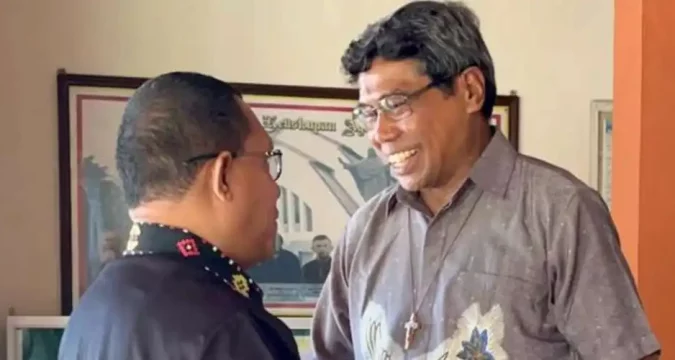
FLORES (UCAN): Following stiff opposition from Church leaders and local people, Melkiades Laka Lena, the governor of East Nusa Tenggara, Indonesia, announced a moratorium on upcoming geothermal projects on Catholic- Flores Island on April 7
“We want to ensure that all aspects related to these projects are reviewed,” Laka Lena said, making the announcement three days after meeting Archbishop Paulus Budi Kleden of Ende.
In January, Archbishop Kleden was the first bishop in Flores to publicly oppose the geothermal projects. Local people have protested for several years, saying the project damages the environment and violates their rights.
In March, six bishops form the Ecclesiastical Province of Ende issued similar objections in their Lenten Pastoral Letter, pointing out the negative impacts of the geothermal projects.
They also urged the government to prioritise tourism, agriculture, plantations, livestock, and marine sectors to benefit locals.
Archbishop Kleden was the first bishop in Flores to publicly oppose the geothermal projects
Laka Lena acknowledged that “there are impacts felt by local residents living in geothermal areas, and we need to hear their voices.”
He said, “We will sit together with stakeholders before making further decisions,” adding that while the projects yet to be launched will be postponed, those underway will be allowed to undertake repair works.
Archbishop Kleden reportedly told the governor during their April 4 meeting that the “Church’s position is clear and based on the aspirations of the local community.”
On March 15, the archbishop met with representatives of Regent Ngada and Ende, together with officials of the geothermal companies.
The meeting was held after the March 12 protests by priests, nuns, and students in Ngada, opposing the Mataloko geothermal project run by the state’s electricity company, PT Perusahaan Listrik Negara.
The project started in 1998 and has failed to generate electricity so far. But its drilling holes continue to emit hot mud up to a height of 500 metres, damaging farmlands in the vicinity.
The geothermal projects in Flores are part of the government’s energy transition plan to meet Indonesia’s target of 35,000 megawatts of electricity infrastructure.
The project started in 1998 and has failed to generate electricity so far. But its drilling holes continue to emit hot mud up to a height of 500 metres, damaging farmlands in the vicinity
The government designated the island as a geothermal spot in 2017. Authorities have identified 16 project sites on the island amid mounting resistance from local people.
According to the Energy and Mineral Resources Ministry, Flores Island has a potential of 902 megawatts or 65 per cent of the total capacity in East Nusa Tenggara province.
Rofinus Rabun, a resident of Wae Sano in West Manggarai district, said they reject geothermal projects because they alter ecosystems and reduce access to vital natural resources like water.
In effect, the project damages the environment and the community’s traditional livelihoods, particularly agriculture and livestock farming, he said.
“Previously, we felt like we were walking alone. We were also labelled stupid for opposing progress,” Rabun said, welcoming the Church’s support.
With the bishops taking a stand, “we feel supported and will fight for our living space,” he added.



